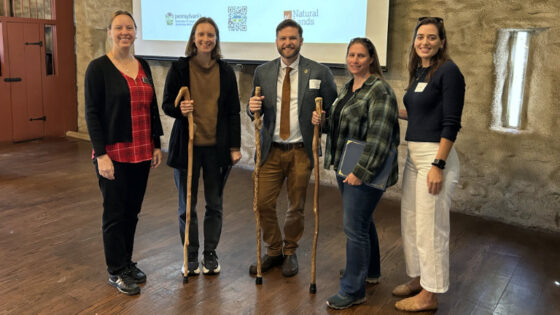FOR IMMEDIATE RELEASE: June 13, 2003
Washington, D.C. — The Natural Resources Conservation Service has named Bernard Sweeney, Ph. D., president of the Stroud Water Research Center in Avondale, Pennsylvania, the recipient of the 2003 Excellence in Conservation Award. NRCS, a division of the U.S. Department of Agriculture, seeks to help people conserve, maintain, and improve the nation¹s natural resources and environment.
The national award, which will be presented on June 13 in Washington, D.C., recognizes Dr. Sweeney and the Stroud Water Research Center for embodying NRCS’s goal of a productive nation in harmony with a quality environment. This years 23 nominees were from the NRCS’s six national regions. Richard Shockley of the Pennsylvania Office of NRCS, submitted Dr. Sweeney’s nomination for his leadership in research on streams, rivers and their watersheds.
NRCS cited the Stroud Water Research Center’s more than 30 years of research on riparian forest buffers, which has demonstrated how tree planting along stream banks improves the water quality and habitat of stream life. The agency also recognized the Center’s willingness to share its research and to develop practical applications for its use.
Each year Stroud educators provide hands-on programs on stream and river ecology to between 4,000 and 5,000 middle- and high-school students, as well as to teachers, conservation groups and government agencies. Many of the field staff of NRCS have received training at the Stroud Water Research Center, which they have subsequently used to plant or preserve hundreds of miles of streamside buffers in Pennsylvania.
The Center is currently working on a multi-year study to assess the rivers, reservoirs and watersheds that supply New York City its drinking water. Over the years Stroud scientists have studied some of the largest rivers in the country, including the Mississippi, Hudson, Savannah, Susquehanna, Flint and Schuylkill rivers.
Dr. Sweeney has spent his career at the Stroud Water Research Center, beginning as a graduate student in 1972 and eventually becoming the Center’s director in 1988. Through his leadership the Stroud Water Research Center has become internationally recognized for its research on natural and disturbed streams. It currently has laboratories along the White Clay Creek in Avondale and in Costa Rica.



